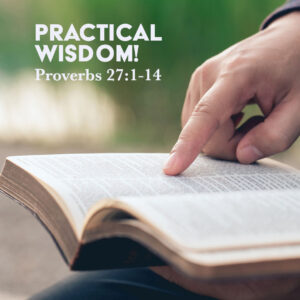Proverbs 27:1-14: Practical Wisdom!
September 18, 2022
TODAY'S BIBLE READING:
Isaiah 46-48, Proverbs 27:1-14, Luke 23:38-43, Hebrews 10:19-39
“Do not boast about tomorrow, for you do not know what a day may bring” (27:1).
Human hubris frequently reaches to the future as part of its domain—and is frequently disappointed by the vanity of such attempts. Outside of God’s Word, we have no knowledge of a moment after this moment. We can look back and say that in the normal course of events this kind of action tends to lead to the next kind of effect. But we do not actually know. And if history teaches us anything, it teaches us that what comes next was not expected by the people before the event. The constant vain attempts to trace “trajectories” of the future are nearly always proven fallacious when the future eventually arises. Instead, as James tells us, we should say “if God wills” such-and-such will happen. We must, of course, plan for the future, but we must not boast about that future.
“Let someone else praise you, and not your own mouth; an outsider, and not your own lips” (27:2).
Sometimes it is tempting to “toot our own horn,” to tell other people what we have done—especially when we feel that other people have not noticed. But the effects of such self-promotion are rarely promising. It is better to let “word-of-mouth” about your character and work be told by others. There is a grapevine of comments about you, and let the work and words of your own efforts be praised by others. Sometimes you will not get the credit you deserve, but God is sovereign, and he will ensure that in time (or if not, in eternity), we will be justly assessed. And when we consider his assessment, we realize that all we have and do only comes from mercy.
“Stone is heavy and sand a burden, but a fool’s provocation is heavier than both” (27:3).
We tend to underplay the weight of psychological or emotional “burdens.” We can see with our own eyes and feel with our own hands the physical weight of sand or rocks. But how can we assess the emotional or psychological (or spiritual) burdens that others carry? Especially difficult is provocation by a fool. If you are ever in a situation where a fool has power over you, pray for strength!
“Anger is cruel and fury overwhelming, but who can stand before jealousy?” (27:4).
When you are the object of someone else’s anger, it can feel overwhelming or too much to bear. But even worse when you are the object of someone else’s jealousy. The impact of that may not initially be so obvious, but jealousy can create the kind of friction and negativity and plain viciousness that makes anger pale into insignificance by comparison.
“Better is open rebuke than hidden love” (27:5).
This sounds a strange proverb! But what it is getting at is the way that concealed, hidden, unreadable relational vibes can be a real test. It is better to know where you stand than to think that at any moment the rug is about to pulled out from under your feet. People normally appreciate direct feedback, even if that feedback is a correction. What is hard to deal with is if you never know where you stand!
“Wounds from a friend can be trusted, but an enemy multiplies kisses” (27:6).
In similar vein to the proverb above, a person you can trust, a real friend, will sometimes say things that hurt. But that is good: they mean well, and their intention is for your flourishing. Treasure those who are brave enough to tell you where you need to improve. It means that they want you to improve! Whereas, an enemy will always be smooth with you, tend to flatter you, and keep you in the dark by means of emotional pretended affection. If someone says they are a friend, but they never disagree with you, then you may wonder how close a friend they really are. And if someone never says anything but positive things about you, then it is natural to wonder what they really feel—for after all, as we all know, there are things about each of us that is less than positive.
“One who is full loathes honey from the comb, but to the hungry even what is bitter tastes sweet” (27:7).
This principle works out in many different situations. It is hard to satisfy people who are already satiated with food, spiritual or otherwise. But then when someone has a hunger for God—they hunger and thirst for righteousness—then what is being fed to them will seem sweet, even if it is not objectively as high quality as the nourishment that is being rejected by those who are overfed.
“Like a bird that flees its nest is anyone who flees from home” (27:8).
There is safety in home life, for a man or woman, a husband or wife. Don’t be always on the road, if you can possibly avoid it. Temptations come as you travel. Be at home; relish the times you can find to build a home life.
“Perfume and incense bring joy to the heart, and the pleasantness of a friend springs from their heartfelt advice” (27:9).
Another proverb about the true nature of friendship. A real friend will, with kindness, of course, tell you it as it really is and give you counsel that you truly need to hear—but others would not tell you.
“Do not forsake your friend or a friend of your family, and do not go to your relative’s house when disaster strikes you—better a neighbor nearby than a relative far away” (27:10).
Friends need to be maintained, both personal friends and family friends. When you get far away from father or mother, brother or sister, a true friend will be there to help when others cannot be. It is wise to invest in good friendships. Take the time to think through who your friends are. Make a list. And plan how to invest in those friendships through words and committed quality time.
“Be wise, my son, and bring joy to my heart; then I can answer anyone who treats me with contempt” (27:11).
A simple proverb urging wisdom. What wisdom is, that is described in many places in the Book of Proverbs. This proverb, though, simply gives a motivation to pursue wisdom: namely, that it will give joy to your godly parents, your Christlike mentors, and other spiritual friends. Pursue wisdom.
“The prudent see danger and take refuge, but the simple keep going and pay the penalty” (27:12).
Part of wisdom is prudence. And when you are prudent, you look ahead and see a potential pitfall or problem and adjust the trajectory of your life or take refuge from that difficulty in some way or other. That is not fear or cowardice; it is prudence. Only the simple rush in where angels fear to tread.
“Take the garment of one who puts up security for a stranger; hold it in pledge if it is done for an outsider” (27:13).
Getting into debt is to be avoided as much as is possible. Most people advise that debt for purchasing a house (a “mortgage”) is sensible. Some people think that debt for a car is sometimes permissible, if not actually at times just necessary. But outside of that, you want to avoid the credit trap. And if you find someone is liable to “run up credit,” you want to do what you can to wean them from that habit and certainly not give them opportunity to keep on getting into debt.
“If anyone loudly blesses their neighbor early in the morning, it will be taken as a curse” (27:14).
An unvarnished piece of practical advice! Don’t be too cheery, and certainly loud in your cheeriness, first thing in the morning. Many people will consider such positivity before breakfast rather too much to stomach.
ABOUT THE AUTHOR
Josh Moody (Ph.D., University of Cambridge) is the senior pastor of College Church in Wheaton, IL., president and founder of God Centered Life Ministries, and author of several books including How the Bible Can Change Your Life and John 1-12 For You.
WANT MORE?
To receive God Centered Life devotionals directly in your inbox, as well as other resources, enter your email address in the form at the bottom of this page and click "subscribe."


